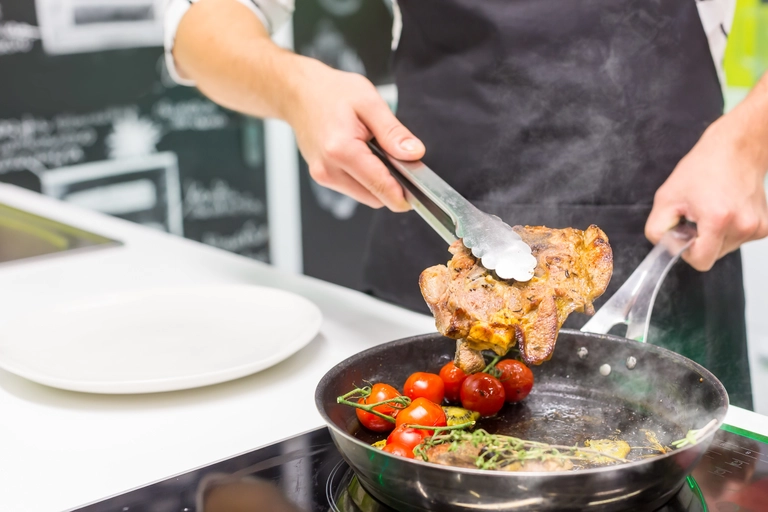
Cooking is both an art and a science. Whether you are a novice in the kitchen or an experienced home chef, mastering certain tips and techniques for cooking This. article provides a comprehensive guide to enhance your cooking skills, improve efficiency, and ensure delicious results.
1. Preparation is Key
Mise en Place: A French term meaning “everything in its place.” Before you start cooking, gather all ingredients and tools. Chop, measure, and organize everything. This streamlines the cooking process and reduces stress.
Read the Recipe: Thoroughly read the recipe before starting. Understand the steps, cooking times, and required techniques. This prevents surprises and mistakes.
2. Master Basic Knife Skills
Proper Grip: Hold the knife with a firm grip, placing your thumb and index finger on the blade’s base. This gives better control and precision.
Chopping Techniques: Learn basic cuts like dicing, julienning, and chiffonading. Uniform cuts ensure even cooking and professional presentation.
Keep Knives Sharp: A sharp knife is safer and more efficient. Regularly sharpen your knives using a honing steel or professional sharpening service.
3. Cooking Techniques
Sautéing: Use high heat and a small amount of oil to cook food quickly. Keep the food moving to prevent sticking and ensure even cooking.
Roasting: Ideal for vegetables and meats. Use a high-temperature oven to develop deep flavors and caramelization. Preheat the oven and avoid overcrowding the pan.
Simmering vs. Boiling: Simmering (gentle bubbling) is best for soups and stews to develop flavors slowly. Boiling (rapid bubbling) is used for pasta and blanching vegetables.
Grilling: Preheat the grill and oil the grates to prevent sticking. Use direct heat for quick-cooking items like burgers and steaks, and indirect heat for larger cuts of meat.
4. Seasoning and Flavoring
Salt Wisely: Salt enhances flavor but can easily be overdone. Season throughout the cooking process, not just at the end.
Herbs and Spices: Fresh herbs like basil and parsley are added at the end of cooking, while hardy herbs like rosemary and thyme can withstand longer cooking times. Toast spices briefly to release their full aroma.
Acidity: A splash of vinegar, citrus juice, or wine can brighten and balance flavors. Acidity can cut through richness and add depth to your dishes.
Umami: Enhance umami flavors using ingredients like soy sauce, mushrooms, tomatoes, and cheese. These add a savory depth to your meals.
5. Baking Tips
Precision: Baking is a science requiring precise measurements. Use a kitchen scale for accuracy, especially with flour and sugar.
Room Temperature Ingredients: Many baking recipes call for room-temperature ingredients like butter and eggs. This ensures better mixing and consistency.
Don’t Overmix: Overmixing can lead to tough baked goods. Mix until ingredients are just combined.
Proper Pan Preparation: Grease and line pans as directed to prevent sticking. For cakes, allow them to cool slightly before removing them from the pan.
6. Time Management
Multitask Smartly: While one part of your dish is cooking, prepare other ingredients or clean up. This keeps you efficient and organized.
Use Timers: Set timers for each stage of cooking to avoid overcooking or burning. Multiple timers can be handy for complex recipes.
7. Learn From Mistakes
Taste as You Go: Regularly taste your food throughout the cooking process. Adjust seasoning and flavors as needed.
Experiment: Don’t be afraid to try new techniques and ingredients. Cooking is a learning process, and mistakes can lead to discoveries.
Seek Feedback: Share your food with others and ask for constructive criticism. This helps you improve and gain new perspectives.
8. Healthy Cooking
Use Healthy Fats: Opt for olive oil, avocado oil, and other healthy fats. Avoid excessive use of butter and processed oils.
Incorporate Whole Foods: Use fresh vegetables, whole grains, and lean proteins. Minimize processed foods and added sugars.
Balanced Meals: Aim for balanced meals with a mix of proteins, carbohydrates, and healthy fats. This ensures nutritional completeness and satisfaction.
Conclusion
Cooking is a journey that evolves with practice and experimentation. By mastering these tips and techniques, you can enhance your culinary skills, create delicious meals, and enjoy the process. Remember, the most important ingredient in any dish is the love and care you put into making it. Happy cooking!







